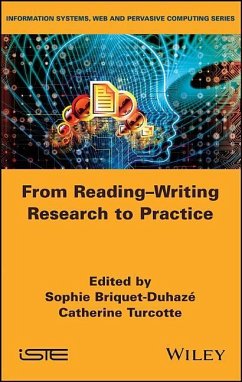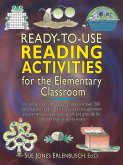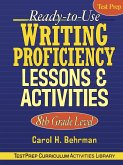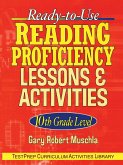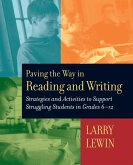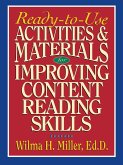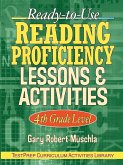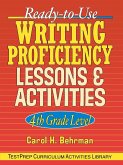From Reading-Writing Research to Practice
Herausgeber: Briquet-Duhazé, Sophie; Turcotte, Catherine
From Reading-Writing Research to Practice
Herausgeber: Briquet-Duhazé, Sophie; Turcotte, Catherine
- Gebundenes Buch
- Merkliste
- Auf die Merkliste
- Bewerten Bewerten
- Teilen
- Produkt teilen
- Produkterinnerung
- Produkterinnerung
Teachers regularly seek to update their practice with newly-developed tools from the realm of research, with the aim of applying them directly in the classroom, particularly for teaching reading and writing. Thus, teachers' continuing education is dependent on the effective dissemination and appropriation of research results. This book explores this problem from multiple angles, presenting research projects from France and Quebec, Canada. Using a variety of methods, including creating teaching materials and engaging classroom teachers in the research process, the authors demonstrate the…mehr
Andere Kunden interessierten sich auch für
![Ready-To-Use Reading Activities for the Elementary Classroom Ready-To-Use Reading Activities for the Elementary Classroom]() Sue Jones ErlenbuschReady-To-Use Reading Activities for the Elementary Classroom26,99 €
Sue Jones ErlenbuschReady-To-Use Reading Activities for the Elementary Classroom26,99 €![Ready-To-Use Writing Proficiency Lessons & Activities Ready-To-Use Writing Proficiency Lessons & Activities]() Carol H BehrmanReady-To-Use Writing Proficiency Lessons & Activities28,99 €
Carol H BehrmanReady-To-Use Writing Proficiency Lessons & Activities28,99 €![Ready-To-Use Reading Proficiency Lessons & Activities Ready-To-Use Reading Proficiency Lessons & Activities]() Gary R MuschlaReady-To-Use Reading Proficiency Lessons & Activities28,99 €
Gary R MuschlaReady-To-Use Reading Proficiency Lessons & Activities28,99 €![Paving the Way in Reading and Writing Paving the Way in Reading and Writing]() Larry G LewinPaving the Way in Reading and Writing24,99 €
Larry G LewinPaving the Way in Reading and Writing24,99 €![Ready-To-Use Activities & Materials for Improving Content Reading Skills Ready-To-Use Activities & Materials for Improving Content Reading Skills]() Wilma H MillerReady-To-Use Activities & Materials for Improving Content Reading Skills30,99 €
Wilma H MillerReady-To-Use Activities & Materials for Improving Content Reading Skills30,99 €![Ready-To-Use Reading Proficiency Lessons & Activities Ready-To-Use Reading Proficiency Lessons & Activities]() Gary R MuschlaReady-To-Use Reading Proficiency Lessons & Activities26,99 €
Gary R MuschlaReady-To-Use Reading Proficiency Lessons & Activities26,99 €![Ready-To-Use Writing Proficiency Lessons and Activities Ready-To-Use Writing Proficiency Lessons and Activities]() Carol H BehrmanReady-To-Use Writing Proficiency Lessons and Activities26,99 €
Carol H BehrmanReady-To-Use Writing Proficiency Lessons and Activities26,99 €-
-
-
Teachers regularly seek to update their practice with newly-developed tools from the realm of research, with the aim of applying them directly in the classroom, particularly for teaching reading and writing. Thus, teachers' continuing education is dependent on the effective dissemination and appropriation of research results. This book explores this problem from multiple angles, presenting research projects from France and Quebec, Canada. Using a variety of methods, including creating teaching materials and engaging classroom teachers in the research process, the authors demonstrate the importance of ownership and dissemination of research results in schools. Although this necessity sometimes complicates the work of researchers, it is vital to develop and maintain the relationship between reading-writing research and its practical applications.
Produktdetails
- Produktdetails
- Verlag: Wiley
- Seitenzahl: 176
- Erscheinungstermin: 30. April 2019
- Englisch
- Abmessung: 236mm x 163mm x 20mm
- Gewicht: 567g
- ISBN-13: 9781786303554
- ISBN-10: 1786303558
- Artikelnr.: 55778127
- Herstellerkennzeichnung
- Libri GmbH
- Europaallee 1
- 36244 Bad Hersfeld
- gpsr@libri.de
- Verlag: Wiley
- Seitenzahl: 176
- Erscheinungstermin: 30. April 2019
- Englisch
- Abmessung: 236mm x 163mm x 20mm
- Gewicht: 567g
- ISBN-13: 9781786303554
- ISBN-10: 1786303558
- Artikelnr.: 55778127
- Herstellerkennzeichnung
- Libri GmbH
- Europaallee 1
- 36244 Bad Hersfeld
- gpsr@libri.de
Sophie Briquet-Duhazé is an HDR lecturer in education at École supérieure du professorat et de l'éducation (ESPE) and the Centre interdisciplinaire de Recherche Normand en Education et Formation (CIRNEF), University of Rouen, France. Her research focuses on the impact of phonological awareness training and letter literacy skills on the reading level of struggling students. Catherine Turcotte is Professor of education sciences at Université du Québec à Montréal (UQAM), Canada. Her research interests include the way primary school students, particularly those with learning difficulties, learn to read and write.
Introduction ix
Sophie BRIQUET-DUHAZÉ and Catherine TURCOTTE
Chapter 1. Teaching Reading Comprehension Strategies: A Research Program
Combining Partners from A to Z 1
Catherine TURCOTTE and Marie-Julie GODBOUT
1.1. Introduction 1
1.2. Problematic and conceptual framework 2
1.3. Presentation of the project and the stages of dissemination and
appropriation 3
1.3.1. Step 1: appropriation through collaboration, training and support 3
1.3.2. Step 2: dissemination in professional conferences 7
1.3.3. Step 3: the creation of a guide and internet tools 7
1.4. Reflections and conclusions 8
1.5. Bibliography 9
Chapter 2. Scientific Project: Creating a Website Dedicated to French
Didactics 13
Sophie BRIQUET-DUHAZÉ
2.1. Introduction 13
2.2. Problem and theoretical framework 14
2.3. Presenting the research project 15
2.4. Work carried out between September 2016 and June 2017 18
2.4.1. Construction of the first organization website (plan) based on the
sections already listed 18
2.4.2. A questionnaire survey 19
2.4.3. An interview survey 20
2.5. Work carried out since September 2017 21
2.6. Conclusion 24
2.7. Appendices 24
2.8. Bibliography 31
Chapter 3. Teacher-researcher Dialogue in Differentiated Support to Develop
Students' Skills in Syntax and Punctuation 33
Marie-Hélène GIGUÈRE, Marie NADEAU, Carole FISHER, Rosianne ARSENEAU and
Claude QUEVILLON LACASSE
3.1. Introduction 33
3.2. Problem and conceptual framework 34
3.3. Methodology 38
3.3.1. Participants 38
3.3.2. Context of the research 40
3.3.3. Collection instruments and procedures 41
3.3.4. Assessment protocol 41
3.4. Results 42
3.4.1. Characteristics of effective support methods 42
3.4.2. Personal dimensions related to professional development 46
3.4.3. Dialog between teachers and researchers 51
3.5. Discussion 52
3.5.1. Limitations of our study and future perspectives 54
3.6. Conclusion 55
3.7. Appendices 56
3.8. Bibliography 58
Chapter 4. The Learning Community Mobilized to Raise the Reading Levels of
Adolescents with Intellectual Disabilities 61
Céline CHATENOUD, Catherine TURCOTTE, Rebeca ALDAMA and Sabine CODIO
4.1. Introduction 61
4.2. Theoretical frameworks 62
4.2.1. From knowledge to action: the process of channelling knowledge 62
4.2.2. The learning community 63
4.3. From production to knowledge transfer: the activities carried out 64
4.3.1. Funneling knowledge into action 64
4.3.2. Development of the learning community (action cycle) 66
4.4. Discussion 68
4.5. Conclusion 69
4.6. Bibliography 70
Chapter 5. Teaching Practices that Promote the Development of Reading
Skills in Inclusive Secondary Schools 73
France DUBÉ, Chantal OUELLET, France DUFOUR, Marie-Jocya PAVIEL, Olivier
BRUCHESI, Émilie CLOUTIER and Marc LANDRY
5.1. Introduction 73
5.2. Question and perspective adopted 74
5.3. Reference framework 76
5.4. Methodology 77
5.5. Results 80
5.6. Conclusion 84
5.7. Bibliography 85
Chapter 6. Supporting the Professional Development of Elementary School
Teachers: Action Research in an Aboriginal Context 89
Christiane BLASER and Martin LÉPINE
6.1. Introduction 89
6.2. General context, problem and research objective 90
6.3. Theoretical framework 94
6.3.1. Literary training and reading/appreciation 94
6.3.2. Means of evaluating the reading/appreciation of literary works 97
6.4. Methodology 98
6.5. Some results of the interventions in teaching and reading assessment
101
6.5.1. The impact of the training offered in reading and evaluation 101
6.5.2. The benefits of the material offered: books, document cameras,
reading corners 102
6.5.3. The benefits of the book fair 103
6.5.4. The impact on students 104
6.6. Conclusion 104
6.7. Bibliography 105
Chapter 7. When Researchers Discover that Organizational and Collaboration
Models that are Still Not Very Explicit for School Stakeholders 109
Nathalie PRÉVOST and Catherine TURCOTTE
7.1. Introduction 109
7.2. Context and issues 110
7.3. Reference framework 111
7.3.1. Educational continuity 111
7.3.2. Learning object: written French 112
7.4. Methodology 113
7.4.1. Participants 114
7.4.2. Instrument and procedure 114
7.5. Analysis of the interviews 115
7.6. Results 115
7.6.1. Key factor 1: initiating dialog and engaging transition-friendly
practices 116
7.6.2. Key factor 2: developing a transition plan 116
7.6.3. Key factor 3: giving importance to oral and written language in the
school and classroom 117
7.6.4. Key factor 4: providing leadership during this transition 117
7.6.5. Key factor 5: planning student follow-up between kindergarten and
Grade 1 of elementary school 118
7.7. Dissemination of results to the school community 118
7.8. Conclusion 119
7.9. Bibliography 119
Chapter 8. Encouraging the Appropriation of Research Results on
Morphological Knowledge by School Stakeholders 125
Rachel BERTHIAUME
8.1. Introduction 125
8.2. Question and theoretical framework 126
8.3. Presentation of a research project aiming for the evaluation of the
morphological knowledge of elementary school students 129
8.4. Challenges and obstacles in translating research results into a
didactic book 132
8.4.1. The weaving of links between authors (or how to write with several
hands) 132
8.4.2. The creation of the material 134
8.4.3. External obstacles 137
8.5. Conclusion 138
8.6. Bibliography 139
Conclusion 145
Sophie BRIQUET-DUHAZÉ and Catherine TURCOTTE
List of Authors 147
Index 149
Sophie BRIQUET-DUHAZÉ and Catherine TURCOTTE
Chapter 1. Teaching Reading Comprehension Strategies: A Research Program
Combining Partners from A to Z 1
Catherine TURCOTTE and Marie-Julie GODBOUT
1.1. Introduction 1
1.2. Problematic and conceptual framework 2
1.3. Presentation of the project and the stages of dissemination and
appropriation 3
1.3.1. Step 1: appropriation through collaboration, training and support 3
1.3.2. Step 2: dissemination in professional conferences 7
1.3.3. Step 3: the creation of a guide and internet tools 7
1.4. Reflections and conclusions 8
1.5. Bibliography 9
Chapter 2. Scientific Project: Creating a Website Dedicated to French
Didactics 13
Sophie BRIQUET-DUHAZÉ
2.1. Introduction 13
2.2. Problem and theoretical framework 14
2.3. Presenting the research project 15
2.4. Work carried out between September 2016 and June 2017 18
2.4.1. Construction of the first organization website (plan) based on the
sections already listed 18
2.4.2. A questionnaire survey 19
2.4.3. An interview survey 20
2.5. Work carried out since September 2017 21
2.6. Conclusion 24
2.7. Appendices 24
2.8. Bibliography 31
Chapter 3. Teacher-researcher Dialogue in Differentiated Support to Develop
Students' Skills in Syntax and Punctuation 33
Marie-Hélène GIGUÈRE, Marie NADEAU, Carole FISHER, Rosianne ARSENEAU and
Claude QUEVILLON LACASSE
3.1. Introduction 33
3.2. Problem and conceptual framework 34
3.3. Methodology 38
3.3.1. Participants 38
3.3.2. Context of the research 40
3.3.3. Collection instruments and procedures 41
3.3.4. Assessment protocol 41
3.4. Results 42
3.4.1. Characteristics of effective support methods 42
3.4.2. Personal dimensions related to professional development 46
3.4.3. Dialog between teachers and researchers 51
3.5. Discussion 52
3.5.1. Limitations of our study and future perspectives 54
3.6. Conclusion 55
3.7. Appendices 56
3.8. Bibliography 58
Chapter 4. The Learning Community Mobilized to Raise the Reading Levels of
Adolescents with Intellectual Disabilities 61
Céline CHATENOUD, Catherine TURCOTTE, Rebeca ALDAMA and Sabine CODIO
4.1. Introduction 61
4.2. Theoretical frameworks 62
4.2.1. From knowledge to action: the process of channelling knowledge 62
4.2.2. The learning community 63
4.3. From production to knowledge transfer: the activities carried out 64
4.3.1. Funneling knowledge into action 64
4.3.2. Development of the learning community (action cycle) 66
4.4. Discussion 68
4.5. Conclusion 69
4.6. Bibliography 70
Chapter 5. Teaching Practices that Promote the Development of Reading
Skills in Inclusive Secondary Schools 73
France DUBÉ, Chantal OUELLET, France DUFOUR, Marie-Jocya PAVIEL, Olivier
BRUCHESI, Émilie CLOUTIER and Marc LANDRY
5.1. Introduction 73
5.2. Question and perspective adopted 74
5.3. Reference framework 76
5.4. Methodology 77
5.5. Results 80
5.6. Conclusion 84
5.7. Bibliography 85
Chapter 6. Supporting the Professional Development of Elementary School
Teachers: Action Research in an Aboriginal Context 89
Christiane BLASER and Martin LÉPINE
6.1. Introduction 89
6.2. General context, problem and research objective 90
6.3. Theoretical framework 94
6.3.1. Literary training and reading/appreciation 94
6.3.2. Means of evaluating the reading/appreciation of literary works 97
6.4. Methodology 98
6.5. Some results of the interventions in teaching and reading assessment
101
6.5.1. The impact of the training offered in reading and evaluation 101
6.5.2. The benefits of the material offered: books, document cameras,
reading corners 102
6.5.3. The benefits of the book fair 103
6.5.4. The impact on students 104
6.6. Conclusion 104
6.7. Bibliography 105
Chapter 7. When Researchers Discover that Organizational and Collaboration
Models that are Still Not Very Explicit for School Stakeholders 109
Nathalie PRÉVOST and Catherine TURCOTTE
7.1. Introduction 109
7.2. Context and issues 110
7.3. Reference framework 111
7.3.1. Educational continuity 111
7.3.2. Learning object: written French 112
7.4. Methodology 113
7.4.1. Participants 114
7.4.2. Instrument and procedure 114
7.5. Analysis of the interviews 115
7.6. Results 115
7.6.1. Key factor 1: initiating dialog and engaging transition-friendly
practices 116
7.6.2. Key factor 2: developing a transition plan 116
7.6.3. Key factor 3: giving importance to oral and written language in the
school and classroom 117
7.6.4. Key factor 4: providing leadership during this transition 117
7.6.5. Key factor 5: planning student follow-up between kindergarten and
Grade 1 of elementary school 118
7.7. Dissemination of results to the school community 118
7.8. Conclusion 119
7.9. Bibliography 119
Chapter 8. Encouraging the Appropriation of Research Results on
Morphological Knowledge by School Stakeholders 125
Rachel BERTHIAUME
8.1. Introduction 125
8.2. Question and theoretical framework 126
8.3. Presentation of a research project aiming for the evaluation of the
morphological knowledge of elementary school students 129
8.4. Challenges and obstacles in translating research results into a
didactic book 132
8.4.1. The weaving of links between authors (or how to write with several
hands) 132
8.4.2. The creation of the material 134
8.4.3. External obstacles 137
8.5. Conclusion 138
8.6. Bibliography 139
Conclusion 145
Sophie BRIQUET-DUHAZÉ and Catherine TURCOTTE
List of Authors 147
Index 149
Introduction ix
Sophie BRIQUET-DUHAZÉ and Catherine TURCOTTE
Chapter 1. Teaching Reading Comprehension Strategies: A Research Program
Combining Partners from A to Z 1
Catherine TURCOTTE and Marie-Julie GODBOUT
1.1. Introduction 1
1.2. Problematic and conceptual framework 2
1.3. Presentation of the project and the stages of dissemination and
appropriation 3
1.3.1. Step 1: appropriation through collaboration, training and support 3
1.3.2. Step 2: dissemination in professional conferences 7
1.3.3. Step 3: the creation of a guide and internet tools 7
1.4. Reflections and conclusions 8
1.5. Bibliography 9
Chapter 2. Scientific Project: Creating a Website Dedicated to French
Didactics 13
Sophie BRIQUET-DUHAZÉ
2.1. Introduction 13
2.2. Problem and theoretical framework 14
2.3. Presenting the research project 15
2.4. Work carried out between September 2016 and June 2017 18
2.4.1. Construction of the first organization website (plan) based on the
sections already listed 18
2.4.2. A questionnaire survey 19
2.4.3. An interview survey 20
2.5. Work carried out since September 2017 21
2.6. Conclusion 24
2.7. Appendices 24
2.8. Bibliography 31
Chapter 3. Teacher-researcher Dialogue in Differentiated Support to Develop
Students' Skills in Syntax and Punctuation 33
Marie-Hélène GIGUÈRE, Marie NADEAU, Carole FISHER, Rosianne ARSENEAU and
Claude QUEVILLON LACASSE
3.1. Introduction 33
3.2. Problem and conceptual framework 34
3.3. Methodology 38
3.3.1. Participants 38
3.3.2. Context of the research 40
3.3.3. Collection instruments and procedures 41
3.3.4. Assessment protocol 41
3.4. Results 42
3.4.1. Characteristics of effective support methods 42
3.4.2. Personal dimensions related to professional development 46
3.4.3. Dialog between teachers and researchers 51
3.5. Discussion 52
3.5.1. Limitations of our study and future perspectives 54
3.6. Conclusion 55
3.7. Appendices 56
3.8. Bibliography 58
Chapter 4. The Learning Community Mobilized to Raise the Reading Levels of
Adolescents with Intellectual Disabilities 61
Céline CHATENOUD, Catherine TURCOTTE, Rebeca ALDAMA and Sabine CODIO
4.1. Introduction 61
4.2. Theoretical frameworks 62
4.2.1. From knowledge to action: the process of channelling knowledge 62
4.2.2. The learning community 63
4.3. From production to knowledge transfer: the activities carried out 64
4.3.1. Funneling knowledge into action 64
4.3.2. Development of the learning community (action cycle) 66
4.4. Discussion 68
4.5. Conclusion 69
4.6. Bibliography 70
Chapter 5. Teaching Practices that Promote the Development of Reading
Skills in Inclusive Secondary Schools 73
France DUBÉ, Chantal OUELLET, France DUFOUR, Marie-Jocya PAVIEL, Olivier
BRUCHESI, Émilie CLOUTIER and Marc LANDRY
5.1. Introduction 73
5.2. Question and perspective adopted 74
5.3. Reference framework 76
5.4. Methodology 77
5.5. Results 80
5.6. Conclusion 84
5.7. Bibliography 85
Chapter 6. Supporting the Professional Development of Elementary School
Teachers: Action Research in an Aboriginal Context 89
Christiane BLASER and Martin LÉPINE
6.1. Introduction 89
6.2. General context, problem and research objective 90
6.3. Theoretical framework 94
6.3.1. Literary training and reading/appreciation 94
6.3.2. Means of evaluating the reading/appreciation of literary works 97
6.4. Methodology 98
6.5. Some results of the interventions in teaching and reading assessment
101
6.5.1. The impact of the training offered in reading and evaluation 101
6.5.2. The benefits of the material offered: books, document cameras,
reading corners 102
6.5.3. The benefits of the book fair 103
6.5.4. The impact on students 104
6.6. Conclusion 104
6.7. Bibliography 105
Chapter 7. When Researchers Discover that Organizational and Collaboration
Models that are Still Not Very Explicit for School Stakeholders 109
Nathalie PRÉVOST and Catherine TURCOTTE
7.1. Introduction 109
7.2. Context and issues 110
7.3. Reference framework 111
7.3.1. Educational continuity 111
7.3.2. Learning object: written French 112
7.4. Methodology 113
7.4.1. Participants 114
7.4.2. Instrument and procedure 114
7.5. Analysis of the interviews 115
7.6. Results 115
7.6.1. Key factor 1: initiating dialog and engaging transition-friendly
practices 116
7.6.2. Key factor 2: developing a transition plan 116
7.6.3. Key factor 3: giving importance to oral and written language in the
school and classroom 117
7.6.4. Key factor 4: providing leadership during this transition 117
7.6.5. Key factor 5: planning student follow-up between kindergarten and
Grade 1 of elementary school 118
7.7. Dissemination of results to the school community 118
7.8. Conclusion 119
7.9. Bibliography 119
Chapter 8. Encouraging the Appropriation of Research Results on
Morphological Knowledge by School Stakeholders 125
Rachel BERTHIAUME
8.1. Introduction 125
8.2. Question and theoretical framework 126
8.3. Presentation of a research project aiming for the evaluation of the
morphological knowledge of elementary school students 129
8.4. Challenges and obstacles in translating research results into a
didactic book 132
8.4.1. The weaving of links between authors (or how to write with several
hands) 132
8.4.2. The creation of the material 134
8.4.3. External obstacles 137
8.5. Conclusion 138
8.6. Bibliography 139
Conclusion 145
Sophie BRIQUET-DUHAZÉ and Catherine TURCOTTE
List of Authors 147
Index 149
Sophie BRIQUET-DUHAZÉ and Catherine TURCOTTE
Chapter 1. Teaching Reading Comprehension Strategies: A Research Program
Combining Partners from A to Z 1
Catherine TURCOTTE and Marie-Julie GODBOUT
1.1. Introduction 1
1.2. Problematic and conceptual framework 2
1.3. Presentation of the project and the stages of dissemination and
appropriation 3
1.3.1. Step 1: appropriation through collaboration, training and support 3
1.3.2. Step 2: dissemination in professional conferences 7
1.3.3. Step 3: the creation of a guide and internet tools 7
1.4. Reflections and conclusions 8
1.5. Bibliography 9
Chapter 2. Scientific Project: Creating a Website Dedicated to French
Didactics 13
Sophie BRIQUET-DUHAZÉ
2.1. Introduction 13
2.2. Problem and theoretical framework 14
2.3. Presenting the research project 15
2.4. Work carried out between September 2016 and June 2017 18
2.4.1. Construction of the first organization website (plan) based on the
sections already listed 18
2.4.2. A questionnaire survey 19
2.4.3. An interview survey 20
2.5. Work carried out since September 2017 21
2.6. Conclusion 24
2.7. Appendices 24
2.8. Bibliography 31
Chapter 3. Teacher-researcher Dialogue in Differentiated Support to Develop
Students' Skills in Syntax and Punctuation 33
Marie-Hélène GIGUÈRE, Marie NADEAU, Carole FISHER, Rosianne ARSENEAU and
Claude QUEVILLON LACASSE
3.1. Introduction 33
3.2. Problem and conceptual framework 34
3.3. Methodology 38
3.3.1. Participants 38
3.3.2. Context of the research 40
3.3.3. Collection instruments and procedures 41
3.3.4. Assessment protocol 41
3.4. Results 42
3.4.1. Characteristics of effective support methods 42
3.4.2. Personal dimensions related to professional development 46
3.4.3. Dialog between teachers and researchers 51
3.5. Discussion 52
3.5.1. Limitations of our study and future perspectives 54
3.6. Conclusion 55
3.7. Appendices 56
3.8. Bibliography 58
Chapter 4. The Learning Community Mobilized to Raise the Reading Levels of
Adolescents with Intellectual Disabilities 61
Céline CHATENOUD, Catherine TURCOTTE, Rebeca ALDAMA and Sabine CODIO
4.1. Introduction 61
4.2. Theoretical frameworks 62
4.2.1. From knowledge to action: the process of channelling knowledge 62
4.2.2. The learning community 63
4.3. From production to knowledge transfer: the activities carried out 64
4.3.1. Funneling knowledge into action 64
4.3.2. Development of the learning community (action cycle) 66
4.4. Discussion 68
4.5. Conclusion 69
4.6. Bibliography 70
Chapter 5. Teaching Practices that Promote the Development of Reading
Skills in Inclusive Secondary Schools 73
France DUBÉ, Chantal OUELLET, France DUFOUR, Marie-Jocya PAVIEL, Olivier
BRUCHESI, Émilie CLOUTIER and Marc LANDRY
5.1. Introduction 73
5.2. Question and perspective adopted 74
5.3. Reference framework 76
5.4. Methodology 77
5.5. Results 80
5.6. Conclusion 84
5.7. Bibliography 85
Chapter 6. Supporting the Professional Development of Elementary School
Teachers: Action Research in an Aboriginal Context 89
Christiane BLASER and Martin LÉPINE
6.1. Introduction 89
6.2. General context, problem and research objective 90
6.3. Theoretical framework 94
6.3.1. Literary training and reading/appreciation 94
6.3.2. Means of evaluating the reading/appreciation of literary works 97
6.4. Methodology 98
6.5. Some results of the interventions in teaching and reading assessment
101
6.5.1. The impact of the training offered in reading and evaluation 101
6.5.2. The benefits of the material offered: books, document cameras,
reading corners 102
6.5.3. The benefits of the book fair 103
6.5.4. The impact on students 104
6.6. Conclusion 104
6.7. Bibliography 105
Chapter 7. When Researchers Discover that Organizational and Collaboration
Models that are Still Not Very Explicit for School Stakeholders 109
Nathalie PRÉVOST and Catherine TURCOTTE
7.1. Introduction 109
7.2. Context and issues 110
7.3. Reference framework 111
7.3.1. Educational continuity 111
7.3.2. Learning object: written French 112
7.4. Methodology 113
7.4.1. Participants 114
7.4.2. Instrument and procedure 114
7.5. Analysis of the interviews 115
7.6. Results 115
7.6.1. Key factor 1: initiating dialog and engaging transition-friendly
practices 116
7.6.2. Key factor 2: developing a transition plan 116
7.6.3. Key factor 3: giving importance to oral and written language in the
school and classroom 117
7.6.4. Key factor 4: providing leadership during this transition 117
7.6.5. Key factor 5: planning student follow-up between kindergarten and
Grade 1 of elementary school 118
7.7. Dissemination of results to the school community 118
7.8. Conclusion 119
7.9. Bibliography 119
Chapter 8. Encouraging the Appropriation of Research Results on
Morphological Knowledge by School Stakeholders 125
Rachel BERTHIAUME
8.1. Introduction 125
8.2. Question and theoretical framework 126
8.3. Presentation of a research project aiming for the evaluation of the
morphological knowledge of elementary school students 129
8.4. Challenges and obstacles in translating research results into a
didactic book 132
8.4.1. The weaving of links between authors (or how to write with several
hands) 132
8.4.2. The creation of the material 134
8.4.3. External obstacles 137
8.5. Conclusion 138
8.6. Bibliography 139
Conclusion 145
Sophie BRIQUET-DUHAZÉ and Catherine TURCOTTE
List of Authors 147
Index 149

